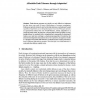Free Online Productivity Tools
i2Speak
i2Symbol
i2OCR
iTex2Img
iWeb2Print
iWeb2Shot
i2Type
iPdf2Split
iPdf2Merge
i2Bopomofo
i2Arabic
i2Style
i2Image
i2PDF
iLatex2Rtf
Sci2ools
100
click to vote
IPPS
1998
IEEE
1998
IEEE
Affordable Fault Tolerance Through Adaptation
Fault-tolerant programs are typically not only difficult to implement but also incur extra costs in terms of performance or resource consumption. Failures are typically relatively rare but the fault-tolerance overhead must be paid regardless if any failures occur during the program execution. This paper presents an approach that reduces the cost of fault-tolerance, namely, adaptations to a change in failure model. In particular, a program that assumes no failures (or only benign failures) is combined with a component that is responsible for detecting if failures occur and then switching to a fault-tolerant algorithm. Provided that the detection and adaptation mechanisms are not too expensive, this approach results in a program with smaller fault-tolerance overhead and thus a better performance than a traditional fault-tolerant program. Thus, the high cost of fault-tolerance is only paid when failures actually occur.
Benign Failures | Distributed And Parallel Computing | Fault-tolerance Overhead | Fault-tolerant Program | IPPS 1998 |
Related Content
| Added | 05 Aug 2010 |
| Updated | 05 Aug 2010 |
| Type | Conference |
| Year | 1998 |
| Where | IPPS |
| Authors | Ilwoo Chang, Matti A. Hiltunen, Richard D. Schlichting |
Comments (0)

